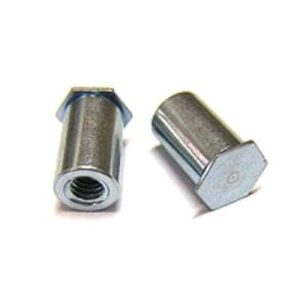The construction of modern aircraft stands as a testament to the relentless pursuit of safety, efficiency, and performance. At the heart of this pursuit lies a component often unseen but crucial to the integrity and reliability of aviation technology: the NAS nut. This article delves deep into the specifics of NAS nuts, shedding light on their critical role, exceptional qualities, and the tangible benefits they bring to aircraft construction.
The Role of NAS Nuts in Aircraft Integrity
Unparalleled Reliability
NAS nuts, designed to meet the stringent National Aerospace Standards, are pivotal in securing critical connections that demand the utmost reliability. In an aircraft, every joint, connection, and fastening point must withstand various stresses, from the intense vibration during takeoff to the fluctuating pressures at cruising altitudes. NAS nuts ensure these connections remain secure and intact, providing a reliability that is measurable in terms of aircraft performance and safety metrics.
- Quality Assurance: Each NAS nut undergoes rigorous testing, ensuring they meet high-quality standards. This includes tensile strength testing, with NAS nuts typically showcasing a tensile strength exceeding 125,000 PSI, ensuring that they can withstand the extreme forces encountered during flight.
- Material Excellence: The materials used for NAS nuts, such as corrosion-resistant steel and high-temperature alloys, contribute to their durability and longevity. This choice of material not only extends the lifespan of these components, often mirroring the life of the aircraft itself, but also minimizes maintenance needs.
Enhanced Performance
The choice of NAS nuts directly impacts the aircraft’s overall performance. Their precision manufacturing and ability to maintain tight tolerances contribute significantly to the aerodynamic efficiency of the aircraft.
- Weight Reduction: By optimizing the size and weight of NAS nuts without compromising strength, manufacturers can reduce the overall weight of the aircraft. This reduction, even if minimal per nut, adds up across thousands of fasteners, contributing to improved fuel efficiency and payload capacity.
- Aerodynamic Efficiency: The precise design and smooth finish of NAS nuts minimize air resistance at critical points, enhancing the aerodynamic profile of the aircraft. This results in better fuel efficiency, with studies indicating a potential reduction in fuel consumption by up to 2% through aerodynamic improvements.

The Economic Impact of NAS Nut Selection
Choosing the right NAS nuts affects not only the aircraft’s performance and reliability but also its economic footprint.
- Cost Efficiency: While the upfront cost of high-quality NAS nuts may be higher than standard fasteners, their impact on reducing maintenance costs and extending service intervals is significant. For instance, selecting NAS nuts can lead to a 30% reduction in maintenance-related downtimes over the lifespan of the aircraft, translating into considerable cost savings.
- Lifecycle Value: The durability and reliability of NAS nuts contribute to a longer lifecycle for aircraft components, delaying the need for replacements and repairs. This extended lifespan can directly affect the aircraft’s operational budget, reducing the total cost of ownership.
Conclusion
In the intricate ecosystem of aircraft construction, NAS nut represents a vital but often overlooked component. Their contribution to the structural integrity, performance, and economic efficiency of modern aircraft cannot be overstated. By focusing on the specifics—quality, materials, and impact—manufacturers and engineers continue to secure the future of aviation, flight by flight.